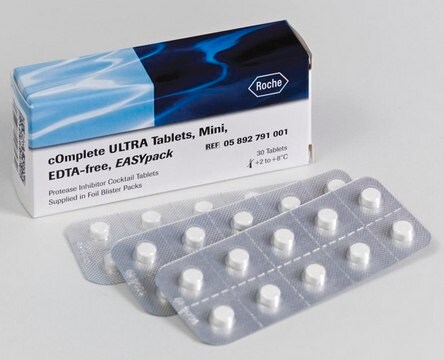11836170001
Roche
cOmplete™, Mini, EDTA-free Protease Inhibitor Cocktail
Protease Inhibitor Cocktail Tablets provided in a glass vial, Tablets provided in a glass vial
Synonym(s):
protease inhibitor, protease inhibitor cocktail, roche protease inhibitor
About This Item
Recommended Products
form
tablet
usage
sufficient for 25 10mL extraction solution preparations
packaging
vial of 25 tablets
manufacturer/tradename
Roche
technique(s)
inhibition assay: suitable
solubility
aqueous buffer: soluble
storage temp.
2-8°C
General description
Due to the optimized composition of the tablets, they show excellent inhibition of serine and cysteine proteases, and well suited for the protection of proteins isolated from animal tissues, plants, yeast, and bacteria. cOmplete, Mini, EDTA-free tablets, contains both irreversible and reversible protease inhibitors. Metallo- and aspartic proteases are not inhibited.
cOmplete Mini, EDTA-free Tablets are identical to cOmplete Mini Tablets, the only difference being that no EDTA or other chelating (e.g. EGTA) agents are included.
Specificity
Application
cOmplete, Mini, EDTA-free Tablets, are used for the inhibition of proteolytic activity in small volumes (up to 10 ml) in which EDTA may interfere with protein stability (e.g., metal-containing proteins) or subsequent assays. Since EDTA interferes with IMAC (Immobilized Metal Affinity Chromatography), cOmplete, Mini, EDTA-free, is preferentially used in the isolation process of Poly-His-tagged fusion proteins.
If it is necessary to inhibit proteolytic activity in a large volume (up to 50 ml), we recommend to use cOmplete, EDTA-free.
- resuspension buffer for nuclear lysates preparation from prostate cancer cell lines for chromatin and RNA immunoprecipitation
- resuspension buffer for protein extraction from neurospheres for western blot analysis
- homogenization buffer for protein extraction from rat left ventricle samples and immunoprecipitaion buffer for human embryonic kidney 293 (HEK293) cells
Features and Benefits
- Easy-to-use: Simply drop a quick-dissolving tablet into your buffer.
- Safe: Choose non-toxic inhibitors that pose no risk to you or those around you.
- Complete protection: Instantly protect your proteins against a broad range of proteases.
- Flexible: Protect proteins in extracts from almost any tissue or cell, including animals, plants, yeast, bacteria, or fungi.
Components
Quality
Physical form
Preparation Note
Working solution: Preparation of Working Solution:
One cOmplete Mini EDTA-free tablet is sufficient for the inhibition of the proteolytic activity in 10 ml extraction solution. When very high proteolytic activity is present, one tablet should be used for 7 ml extraction buffer. Tablets can be added directly to the extraction medium. Alternatively a stock solution (7 X conc.) can be prepared.
Stock solution (7 X conc.):
Dissolve one cOmplete Mini EDTA-free tablet in 1.5 ml dist. water or in 1.5 ml 100 mM phosphate buffer, pH 7.0.
Storage conditions (working solution): The stock solution can be stored at 2 to 8 °C for 1 to 2 weeks, or at least 12 weeks at -15 to -25 °C.
Reconstitution
Legal Information
also commonly purchased with this product
signalword
Warning
hcodes
Hazard Classifications
Eye Irrit. 2 - Skin Irrit. 2
Storage Class
11 - Combustible Solids
wgk_germany
WGK 1
flash_point_f
does not flash
flash_point_c
does not flash
Certificates of Analysis (COA)
Search for Certificates of Analysis (COA) by entering the products Lot/Batch Number. Lot and Batch Numbers can be found on a product’s label following the words ‘Lot’ or ‘Batch’.
Already Own This Product?
Find documentation for the products that you have recently purchased in the Document Library.
Customers Also Viewed
Articles
Get maximum protection after protein isolation by using protease and phosphatase inhibitor cocktail tablets from Roche.
Protocols
Dissolve one tablet in 10 ml aqueous buffer or water. If high proteolytic activity is present, dissolve one tablet in 7 ml buffer.
Related Content
An overview of cell lysis and protein extraction methods including detergent solubilization, freeze-thaw lysis, osmotic shock, sonication, enzymatic cell lysis, and mechanical disruption techniques such as Dounce, Polytron, and mortar and pestle homogenization.
Our team of scientists has experience in all areas of research including Life Science, Material Science, Chemical Synthesis, Chromatography, Analytical and many others.
Contact Technical Service

